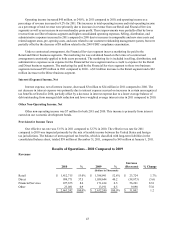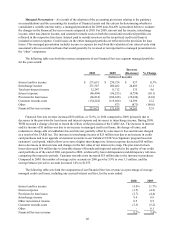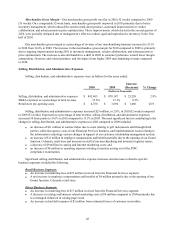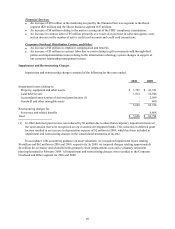Cabela's 2011 Annual Report Download - page 62
Download and view the complete annual report
Please find page 62 of the 2011 Cabela's annual report below. You can navigate through the pages in the report by either clicking on the pages listed below, or by using the keyword search tool below to find specific information within the annual report.
52
uses a migration analysis and historical bankruptcy and death rates to estimate the likelihood that a credit card
loan will progress through the various stages of delinquency and to charge-off. This analysis estimates the gross
amount of principal that will be charged off over the next twelve months, net of recoveries. This estimate is used
to derive an estimated allowance for loan losses. In addition to these methods of measurement, management
also considers other factors such as general economic and business conditions affecting key lending areas, credit
concentration, changes in origination and portfolio management, and credit quality trends. Since the evaluation
of the inherent loss with respect to these factors is subject to a high degree of uncertainty, the measurement of
the overall allowance is subject to estimation risk, and the amount of actual losses can vary significantly from the
estimated amounts.
Charge-offs consist of the uncollectible principal, interest, and fees on a customer’s account. Recoveries are
the amounts collected on previously charged-off accounts. Most bankcard issuers charge off accounts at 180 days.
WFB charges off credit card loans and restructured credit card loans on a daily basis after an account becomes
at a minimum 130 days contractually delinquent to allow us to manage the collection process more efficiently.
Accounts relating to cardholder bankruptcies, cardholder deaths, and fraudulent transactions are charged off
earlier. WFB records charged-off cardholder fees and accrued interest receivable directly against interest and fee
income included in Financial Services revenue.
The following table shows the activity in our allowance for loan losses and charge off activity for the
years ended:
2011 2010 2009
(Dollars in Thousands)
Balance, beginning of year $ 90,900 $ 1,374 $ 1,507
Change in allowance for loan losses upon consolidation
of the Trust - 114,573 -
90,900 115,947 1,507
Provision for loan losses 39,287 66,814 1,107
Charge-offs (75,599) (108,111) (1,429)
Recoveries 18,762 16,250 189
Net charge-offs (56,837) (91,861) (1,240)
Balance, end of year $ 73,350 $ 90,900 $ 1,374
Net charge-offs on securitized credit card loans $ - $ - $ (99,876)
Net charge-offs on credit card loans (56,837) (91,861) (1,240)
Charge-offs of accrued interest and fees (recorded as a
reduction in interest and fee income) (7,683) (12,555) (15,956)
Total net charge-offs including accrued interest and fees $ (64,520) $ (104,416) $ (117,072)
Net charge-offs including accrued interest and fees as a
percentage of average credit card loans 2.35% 4.23% 5.06%
For 2011, net charge-offs as a percentage of our average credit card loans decreased to 2.35%, down 188 basis
points compared to 4.23% for 2010. We believe our charge-off levels remain well below industry averages. Our net
charge-off rates and allowance for loan losses have decreased due to improved outlooks in the quality of our credit
card portfolio evidenced by lower delinquencies and delinquency roll-rates and favorable charge-off trends.
Aging of Credit Cards Loans Outstanding
The quality of our credit card loan portfolio at any time reflects, among other factors: 1) the creditworthiness
of cardholders, 2) general economic conditions, 3) the success of our account management and collection
activities, and 4) the life-cycle stage of the portfolio. During periods of economic weakness, delinquencies and net
























